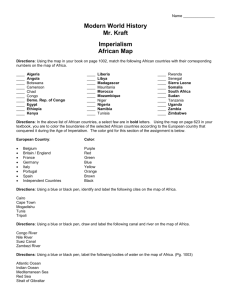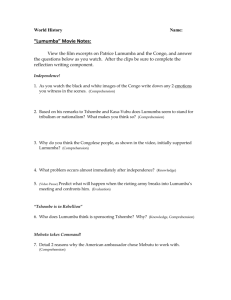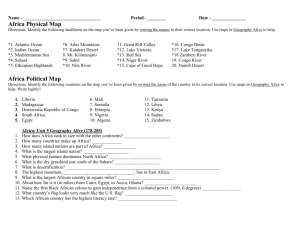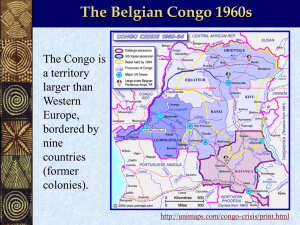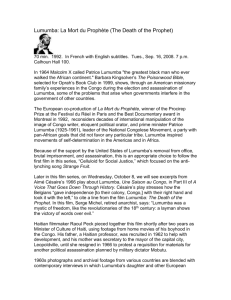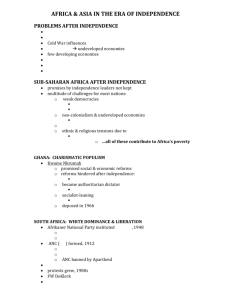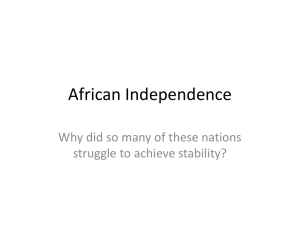How did African and international
advertisement
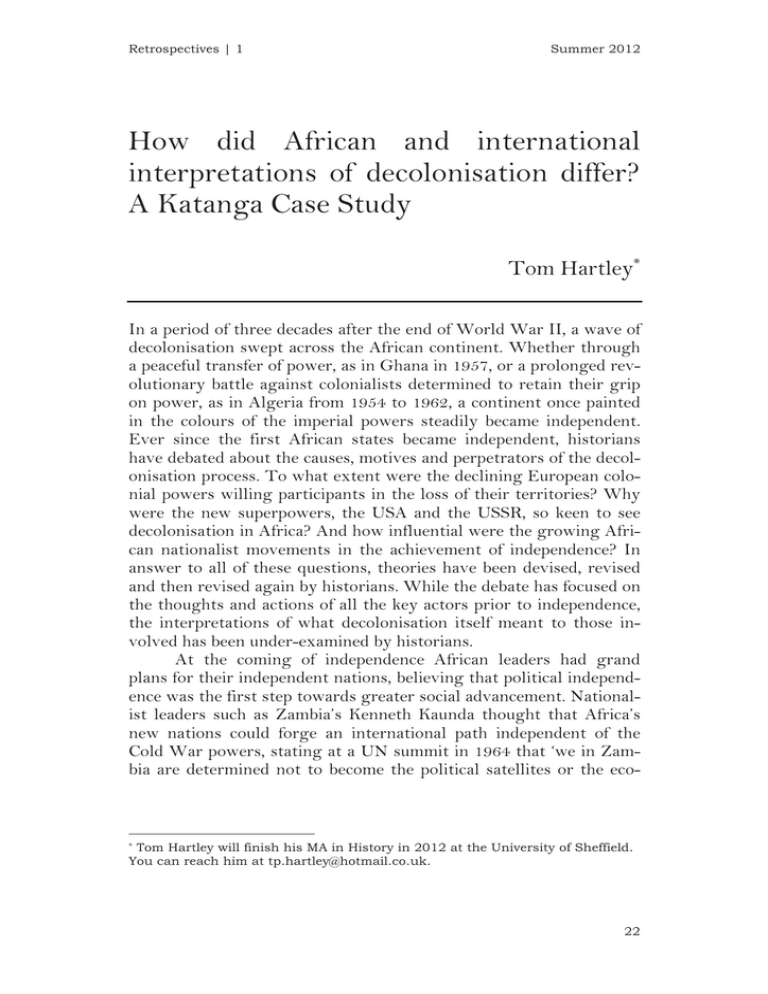
Retrospectives | 1 Summer 2012 How did African and international interpretations of decolonisation differ? A Katanga Case Study Tom Hartley* In a period of three decades after the end of World War II, a wave of decolonisation swept across the African continent. Whether through a peaceful transfer of power, as in Ghana in 1957, or a prolonged revolutionary battle against colonialists determined to retain their grip on power, as in Algeria from 1954 to 1962, a continent once painted in the colours of the imperial powers steadily became independent. Ever since the first African states became independent, historians have debated about the causes, motives and perpetrators of the decolonisation process. To what extent were the declining European colonial powers willing participants in the loss of their territories? Why were the new superpowers, the USA and the USSR, so keen to see decolonisation in Africa? And how influential were the growing African nationalist movements in the achievement of independence? In answer to all of these questions, theories have been devised, revised and then revised again by historians. While the debate has focused on the thoughts and actions of all the key actors prior to independence, the interpretations of what decolonisation itself meant to those involved has been under-examined by historians. At the coming of independence African leaders had grand plans for their independent nations, believing that political independence was the first step towards greater social advancement. Nationalist leaders such as Zambia’s Kenneth Kaunda thought that Africa’s new nations could forge an international path independent of the Cold War powers, stating at a UN summit in 1964 that ‘we in Zambia are determined not to become the political satellites or the eco- Tom Hartley will finish his MA in History in 2012 at the University of Sheffield. You can reach him at tp.hartley@hotmail.co.uk. * 22 Retrospectives | 1 Summer 2012 nomic colonies of anyone in either the East or West’.1 While Kaunda’s idea of a non-aligned ‘Third World’ became institutionalised in 1963 with the formation of the Organisation of African Unity, the new nations struggled to achieve true independence. Ghana’s Kwame Nkrumah argued in 1971 that ‘in place of colonialism as the main instrument of imperialism we have today neo-colonialism’.2 Another issue for the new African states to deal with was the boundaries imposed by Europeans, which was seen as another roadblock to true African independence and debated heavily at the Pan-African Congresses of the 1950s and 1960s. While earlier Congresses consisted of abstract thinking on social advancement amongst African and black intellectuals, by the time of the formation of the OAU Saadia Touval highlights how attention turned to more concrete issues.3 Boundary disputes were the central issue, and were crucial to the different interpretations of decolonisation by African and international organisations. In this essay I will focus on one of these boundary disputes, the secession of Katanga from the Congo, and look at how the attitudes of African and international actors differed. The OAU’s Charter of 1963 had been built on the foundations of the Katangese experience, while the conflict also played a key role on the international stage. The secession is useful in determining what decolonisation actually meant to those involved. I shall begin by assessing the current historiography on the subject and its limitations, before analysing how the words and actions of African and international figures and organisations reflect different interpretations of decolonisation. Lumumba the Communist: Short-Term Motives of the Western Powers As Christopher Clapham argues, African states were achieving independence in an era of bipolar world domination by the two superpowers, and that ‘the gap in terms of every indicator of international power between the two giants and the new, artificial and impoverished states of sub-Saharan Africa was peculiarly acute… a level of K. Kaunda, in Zambia Independence and Beyond: The Speeches of Kenneth Kaunda (London, 1966), p.191. 2 K. Nkrumah, Neo-Colonialism, The Last Stage of Imperialism (London, 1971), p. ix. 3 S. Touval, The Boundary Politics of Independent Africa (Harvard, 1972), p. 49. 1 23 Retrospectives | 1 Summer 2012 inequality that verged on the surreal’.4 Not coincidentally, one of the first battlegrounds of the Cold War was one of the regions of Africa with the greatest potential for wealth and resources, the Congo. The potential wealth of the region had led to its annexation by the Belgian King Leopold II, a contributory factor in the Scramble for Africa in the 1870s and 1880s. Seventy years later, the mineral-rich southern province of Katanga would again be important during the decolonisation process. Leading the dominant local party of Katanga, CONAKAT, Moise Tshombe announced the secession of Katanga from the Congo in July 1960, less than two weeks after Congo’s Independence Day. The historiography on the Katangese secession, and the broader ‘Congo Crisis’, gives a small biographical role to the ill-fated first Prime Minister, Patrice Lumumba, but for the most part is concentrated around the actions of the Cold War powers, Europe, and the UN. Attention focuses on Lumumba’s attempts to seal support from his regime from the Cold War protagonists, the Belgian attempts to secure its position in the Katanga region, and the gradual shift of the USA and UN to support Belgium in seeing the need to remove Lumumba. Historians such as Ludo De Witte and Leo Zeilig have extensively covered Lumumba’s political manoeuvrings as he sought support from either the USA or the USSR. Lumumba’s inaugural speech, in which he criticised the Belgian colonial regime and its hero, Leopold, for their oppression of the Congo, has been seen as the beginning of international movements against him. Zeilig argued that the speech ‘was an insult that the Belgian establishment would never forgive. The Belgian press called for revenge. Never had the dignity of the Belgian state been so insulted’.5 Current historiography would suggest that Lumumba’s audacity to openly criticise Belgium turned the West against him, and resulted in them backing secessionist campaigns including Tshombe’s in Katanga. Western leaders increasingly saw Lumumba as a ‘communist stooge’ who needed to be eliminated.6 However Lumumba only turned to the USSR after the West had failed to support his democratically elected government. David Gibbs argues that ‘the failure of the UN to dislodge Tshombe and the Belgians as quickly as Lumumba wished led the Congo premC. Clapham, Africa and the International System: The Politics of State Survival (Cambridge, 1996), p. 134. 5 L. Zeilig, Patrice Lumumba: Africa’s Lost Leader (London, 2008), p.100. 6 H. MacMillan in Zeilig, Patrice Lumumba, p.127. 4 24 Retrospectives | 1 Summer 2012 ier to call on the Soviet Bloc for assistance and thus to provide the entering wedge for Soviet penetration’.7 As a result historical analysis has turned Lumumba’s dalliance with communism into a ‘chicken and egg’ scenario in explaining Western intervention in the Congo, and places the starting point for that intervention at Lumumba’s controversial speech on Independence Day. On the subject of Western involvement in the Katangese secession, historians’ views differ as to the level of premeditation in their support and the motives behind it. Clapham emphasises the African agency in their dealings with the new global superpowers: ‘the relative insignificance of Africa to the superpowers meant that their activities in the continent were in practice fuelled by the agendas of African actors…. This is clearly indicated by patterns of superpower involvement which are distinguished more by the internal characteristics of the African states in which it occurred, than by criteria such as strategic location or economic resources that might have been expected to make those states of any special interest to outside powers’.8 Narrowing this down to the Congo, Clapham’s view would tend to prioritise the actions of individuals such as Lumumba and Tshombe over bigger actors such as the USA, the UN and the USSR. The success of Lumumba in forming the most nationally popular political party, the Mouvement National Congolais, meant he was less reliant on Belgian support than regional parties. In contrast Tshombe’s Katanga actively sought the support of Belgium, it’s Declaration of Independence ‘asks Belgium to join with Katanga in a close economic community. It asks Belgium to continue its technical, financial and military aid. It asks Belgium to re-establish order and security’.9 Again, this line of enquiry concentrating on the benefits of supporting either Lumumba or Tshombe focuses on international intentions for the Congo after political independence had been achieved, implying that the causes for international support for secession and the planned assassination of Lumumba were short-term. This view is however challenged by Zeilig, who argues that it was inevitable there would be outside pressures on the new nation, stating that ‘there was never any possibility that the Congo would be left to work out its D.N. Gibbs, The Political Economy of Third World Intervention: Mines, Money and US Policy in the Congo Crisis (Chicago, 1991), p.100. 8 Clapham, Africa and the International System, p.138. 9 C. Cruise-O’Brien, To Katanga and Back: A UN Case History (New York, 1962), p. 85. 7 25 Retrospectives | 1 Summer 2012 own independence. Cursed by mineral wealth the country could not be left alone’.10 I will examine the significance of these inherent motives for outside involvement in the Congo later. Still largely unexplored are the different interpretations of decolonisation by international and African actors in the Congo Crisis. Gibbs argues that ‘the most interesting issue, still unresolved, is why the Belgians ended colonial rule so quickly. In any case, the available evidence shows that the Belgians were prepared to dominate the Congo in a neo-colonial manner even after independence’.11 In the remainder of this essay I shall look to explore this conclusion, to establish whether Belgium and the international community as a whole saw decolonisation differently to African leaders and organisations such as the Organisation of African Unity who were pressing on with achieving goals of complete independence and non-alignment. I will begin by looking at what Africans hoped Congolese decolonisation and independence meant in reference to the Katangese Secession. Organisation of Disunity: African Views of Congo’s Independence The organization shall have the following purposes… to defend their sovereignty, their territorial integrity and independence… to eradicate all forms of colonialism from Africa.12 The establishment of the Organisation of African Unity in 1963 had the potential to be a momentous moment for Africa’s new states and its newly freed peoples. The OAU set about idealistic aims for the advancement of Africa, such as the possibility of shaping global affairs without coming under the influence of far more powerful states. Sadly these aspirations would not be realised, and the OAU was accused of becoming a ‘toothless talking shop’ of Heads of State with little real power.13 The secession of Katanga was the first real test of the power of Pan-Africanism, as former ideological divisions reared their heads over the merits of Moise Tshombe’s state. The failure of the OAU to Zeilig, Patrice Lumumba, p. 128. Gibbs, The Political Economy of Third World Intervention, pp. 77-8. 12 The Charter of the Organisation of African Unity, in A.A. Mazrui, Towards a Pax Africana: A Study of Ideology and Ambition (London, 1967), p. 225. 13 T. Murithi, The African Union: Pan-Africanism, Peacebuilding and Development (Aldershot, 2005), p. 26. 10 11 26 Retrospectives | 1 Summer 2012 preserve its own resolutions over the Congo would form a lasting memory, as Vincent Bakpetu Thompson argues ‘since the Congo collapse in 1960 African advocates of non-alignment have continued to plead that the Cold War be kept out of Africa’.14 Despite the ultimate failure of the OAU’s ideals regarding Congolese independence, their utopian views on African independence are crucial in providing a counterweight and balance to international opinions in assessing the discourse of decolonisation. It is these ideals that I shall explore in this chapter. The background to the statement in the OAU’s Charter has been discussed in depth by Saadia Touval. Prior to the founding of the organisation, by which point Patrice Lumumba had already been assassinated and the Congo Crisis had already spiralled out of African control, there had been significant disagreement over the nature of decolonisation amongst African factions. The two factions, the Monrovia Group and the Casablanca Group, have been seen to reflect conservative and radical ideas on African unification respectively however, as Touval contests, ‘neither camp was motivated by any fundamental principles they may have held on boundaries’.15 Instead, it was the issue of neo-colonialism that affected the Casablanca Group of radicals, led by Kwame Nkrumah. Even before the independence of many African nations, neo-colonialism was considered a major threat to the survival of African states. Thompson highlights the scepticism and suspicion of Pan-Africanists to Western interference; ‘an understanding of the psychology of contemporary Africa, after its experiences of colonialism and racialism, would probably illuminate this attitude of African radicals. The fears expressed are genuine and deep-seated’.16 As a result, Nkrumah and his allies wanted to create or maintain strong states that would be able to withstand neo-colonial pressures. The threat of neo-colonialism was soon realised with the Katangese secession. It was this, more than the concern of creating large strong states to further the possibility of a politically unified Africa, which inspired Nkrumah to back Lumumba’s government. But neo-colonialism was not an issue to all African states, and although some, such as the Central African Federation of Rhodesias V.B. Thompson, Africa and Unity: The Evolution of Pan-Africanism (Harlow, 1969), p. 188. 15 Touval, The Boundary Politics of Independent Africa, p. 72. 16 Thompson, Africa and Unity, p. 190. 14 27 Retrospectives | 1 Summer 2012 and Nyasaland, supported Tshombe’s secession through their own self-interest, there were early signs to suggest an African ideological root for supporting the Katangese secession. This centred on a right to self-determination, and the conservative Monrovia Group that supported it also backed Mauritania’s independence against the possibility of Moroccan irredentism. Due to the regional nature of Congolese politics, Tshombe’s presence and popularity in the Katanga region meant that secession was seen by the Monrovia Group as the achievement of Katangese self-determination, and as a result they ‘adopted a conciliatory attitude toward the secessionist regime’.17 Taking this one step further, the Katangese secession could be seen as an act of decolonisation in itself in ending the artificially imposed boundaries that had united the region to the rest of the Congo. However these interpretations failed to take into account that Katanga itself was not united around Tshombe’s CONAKAT party. The Baluba peoples made up a significant minority of the population of the Katanga province, and mainly objected to an independent Katangese state under the control of Tshombe and neo-colonialists.18 With different opinions within the Pan-African movement, the Congo and even Katanga, it was inevitable that the pre-1963 Congresses would fail to form a coherent policy on the Congo Crisis. These conflicting views emanating from African political leaders severely compromised Lumumba’s position and the OAU’s own stance when it eventually ratified its policies in the Charter of 1963. Regardless of which position African states took with regards to eliminating neo-colonialism or promoting self-determination, the policy of non-interference in the internal affairs of other states meant that in the early period of the secession there was no official African voice willing to speak up on behalf of Africa in favour of Lumumba or the secessionists. Coinciding with the disagreements over territorial boundaries, the policy of non-interference further compromised the Congolese state and weakened the OAU’s voice later. Not even the OAU’s Charter of 1963 could define when state security and African independence could override non-interference when it came to African conflicts. As a result of these inherent problems, Lumumba’s faith in the Pan-African movement would be short-lived. Leo Zeilig calls the independent African states ‘false friends’ who offered practical help initially before backing the behaviour of the UN; ‘for Lumumba’, 17 18 Touval, The Boundary Politics of Independent Africa, p. 72. Zeilig, Patrice Lumumba, p. 115. 28 Retrospectives | 1 Summer 2012 he argues, ‘the conference was another illusion destroyed’.19 In Lumumba’s later appeals to outside factions for help in ending the secession, requests to fellow African states are conspicuous by their absence. The focus instead shifts from Belgium to the USA and the UN to the USSR, but never significantly back to Africa. The African stance of non-interference only began to change later, following the death of Lumumba. Thompson highlights that ‘it became increasingly difficult for African states supporting one faction or another to avoid interfering openly in what were supposed to be the domestic affairs of the Congo’. 20 However by this point Africa’s ability to influence events in the region had already been limited by foreign intervention. The early confidence African nationalist leaders had in the United Nations also compounded the problems. Lumumba’s closest allies and so-called ‘radicals’ within Africa advised him to work with the UN and to achieve resolutions with them, even after it had long become clear they were working in favour of the secessionists. Nkrumah told Lumumba ‘your policy ‘to do away with your enemies now’ will fail; you must adopt ‘tactical action’’.21 This suggests that, at least in the early phases of national independence, Nkrumah felt that the international community had a similar interpretation of decolonisation as Africans did, and would help to preserve the agreements espoused in the Pan-African Congresses. This is in sharp contrast to his subsequent views on the threat of neo-colonialism in Africa. By September 1960, when Lumumba realised he needed to act alone to try to stop secession, there were still African states who supported the UN’s involvement. The African community was divided again, ‘one group of African states revolted against the UN, supporting Lumumba’s plan to invade Katanga. But another remained solidly committed to the concept of UN action and sought to persuade the worldorganisation to abandon negotiation in favour of direct action to end the secession’.22 One thing that should be noted here is that, despite the disagreement over means and support for the UN, there is a unity in support for Lumumba and a united Congo. Zeilig’s argument would suggest that the main disagreement within Africa at this stage was now whether the UN was working to preserve the African view 19 20 21 22 Zeilig, Patrice Lumumba, p. 130. Thompson, Africa and Unity, p. 186. Nkrumah, in Zeilig, Patrice Lumumba, p. 130. Zeilig, Patrice Lumumba, p. 117. 29 Retrospectives | 1 Summer 2012 of independence and decolonisation or working as a force for neocolonial interests. Finally, it should be noted that the African community could have seen Lumumba’s actions similarly to Tshombe’s. Lumumba’s decision to invite foreign intervention when help from within Africa was not forthcoming meant Africans, especially those who naturally supported secession, could also level the charge of neo-colonialism at Lumumba. Thompson explains that ‘African states felt uneasy at the Congolese government’s invitation to the Belgians to retrain the national army… seen from a radical Pan-African angle, the Congolese government was unwittingly inviting ‘colonialism’ back to Africa’.23 The extent to which African leaders thought this is difficult to determine but should not be overestimated; those who started supporting Lumumba retained their backing throughout, albeit vocally, and the continuing faith in the UN suggests that most African states saw the foreign presence as a force for good. It is of interest to draw a comparison here between the possible African dislike for Lumumba’s invitation to international powers, and the Western opposition to what they perceived as Lumumba’s welcoming of Soviet invention. In both cases it could be seen that Lumumba’s actions were working against the African and international interpretations of decolonisation respectively. In this chapter I have outlined the conflicting interpretations of decolonisation stemming from within Africa itself. The theories of denying neo-colonialism and promoting self-determinism were impossible to reconcile when it came to the Katangese secession. In turn, the policy of non-interference would damage, rather than ensure, Congolese independence. In the next chapter I will look at how international actors, namely Belgium, the USA and the USSR, interpreted decolonisation in the Congo, and how this differed from the African model. Neo-Colonialism: Before Independence = After Independence The whole of Africa, the entire world, now sees that an attempt is being made to replace one kind of colonialism in the Congo by another kind, in the form of the collective co- 23 Thompson, Africa and Unity, p. 186. 30 Retrospectives | 1 Summer 2012 lonialism of NATO countries, with the blue flag of the United Nations as a cover.24 The Soviet assessment of the neo-colonial presence in the Congo by September 1960 shows how quickly the situation had developed from Patrice Lumumba’s speech in June, which had allegedly provoked the Western response. Leo Zeilig argues that the US government took a stand against Lumumba due to his ‘extreme nationalism’,25 as if to deny that the Congo should be allowed to choose its own path away from foreign influence. The failure of the USA to support the Congo’s territorial integrity and elected leadership turned Lumumba towards the USSR, and in turn gave added justification for the USA to directly oppose him. However David Gibbs argues that American and Belgian interests were synonymous and motivated by economics, and that ‘officials justified these policies in terms of national security because American foreign policy is always justified that way’.26 The threat of Soviet influence would, in this case, appear to justify an intervention that was actually intended to preserve the West’s financial role in the Congo. In this chapter I will examine how both strategic and economic concerns meant that the international interpretation of African decolonisation took on a new meaning when it came to Congolese independence. The Belgian decision to actively and openly support the secession of Katanga clearly reflects an interpretation of decolonisation very different to that which Africans had in mind. However prior to independence there were suggestions that Belgium would allow the Congo to exist independently. For example, the two nations agreed a treaty that included the provision that Belgian troops could not enter Congo unless approved by the new state. As in the early Pan-African agreements, Belgium had at least, albeit temporarily, promised to not interfere with whichever path Congo chose to take in independence. If Belgium ever intended to follow up on this policy of noninterference, it quickly broke this promise and began to interfere with the internal affairs of the Congo even before independence had been fully achieved. No doubt in part down to Lumumba’s ‘populist and Soviet Statement September 1960 in I. Brownlie, Basic Documents on African Affairs (Oxford, 1971), p. 522. 25 Zeilig, Patrice Lumumba, p. 127. 26 Gibbs, The Political Economy of Third World Intervention, p. 101. 24 31 Retrospectives | 1 Summer 2012 anti-Belgian tone’,27 Belgium changed the constitution to grant more power to provincial governments, and parties such as Moise Tshombe’s who required Belgian support and finance to function. Gibbs describes these as ‘discreditable and manifest efforts to sabotage the elections’.28 The efforts by Belgium to forge a stronger alliance with local parties such as Tshombe’s would instigate secession and determine the path of Congolese independence. The changes to the constitution suggest that Belgium was only willing to allow independence and decolonisation if a pro-Belgian government was in charge of the Congo’s resources. The promotion of provincial interests clearly demonstrates a disagreement with African actors of the importance of strong central states. The motives of the Belgian state in weakening the central Congolese state are evident from the press reports of the time. An election observer in the newspaper La Releve remarked that ‘independence was never intended to be anything other than “purely fictitious and nominal”’.29 The importance of Katanga to Belgium meant that the strong non-aligned stance of Lumumba and his fellow African leaders was treated as a threat to the Belgian position. Belgium’s King Badouin laid down the neo-colonial future of the Congo in his speech at independence, discouraging Lumumba from making hasty reforms and changes to the existing system.30 By the late 1950s, African imports accounted for over a third of Belgium’s trade. A political crisis in Belgium itself accentuated the need to retain a controlling influence in Katanga, and Lumumba himself acknowledged ‘Belgium intends to have Katanga, the richest province, because she cannot exist without Katanga and the Congo, as she has said’.31 Domestic circumstances meant that it was inconceivable that Belgium would allow decolonisation to go as Lumumba and other African leaders would have intended. Writing in 1962, Gerhard Everwyn explicitly states the reason for Western interference in the Congo to support Tshombe. Supporting further intervention to stabilise Katanga, he asks ‘is it not realised that not only the territories but also the vast mineral resources of Central and Southern Africa may also eventually be lost to the 27 28 29 30 31 Gibbs, The Political Economy of Third World Intervention, p. 79. Ibid., p. 81. La Releve newspaper in Zeilig, Patrice Lumumba, p. 102. King Badouin in De Witte, The Assassination of Lumumba, p. 1. P. Lumumba in Zeilig, Patrice Lumumba, p. 107. 32 Retrospectives | 1 Summer 2012 Western nations if the rot is not stopped now? These political implications are of first-rate international importance’.32 However Belgium did not need convincing of the importance of Katanga, as politicians and journalists alike rejoiced at the events in the Congo. The newspaper De Standaard outlined it’s neo-colonial vision for the Congo, saying of the Crisis that ‘the only ray of hope in all this chaos is Katanga… a strong Katanga, linked to Belgium, constitutes an element of order and prosperity in Central Africa, around which a larger confederation could be built… This is the policy Belgium must duly adopt’.33 The economic benefits Belgium got out of its persistence in Katanga cannot be disputed. The Social Democrat opposition in parliament supported intervention, stating matter-of-factly ‘while the rest of the Congo gradually fell prey to anarchy, industrial, agricultural and commercial activity continues throughout most of the southern province. We are delighted, because we have important interests there and a large number of settlers’.34 Olivier Boehme confirms that ‘the former coloniser, its business circles included, tried to take advantage of the problems of the young state in order to improve its position’.35 Belgian economic interests clearly took precedence over the desire to help the Congo towards true independence, although it is doubtable that that desire was genuine in the first place. Outside of Belgium the motives and true leaders of the secession were questioned, albeit only by newspapers and critics. The Daily Telegraph said that ‘Mr. Tshombe, the self-styled President, is today far more under the domination of Belgian officials than he ever was an obscure provincial politician before independence’.36 Yet these doubts were not taken up by governments, who, as we have seen, supported the Belgian cause. Zeilig states that ‘the cause of Katanga was defended by lobby groups in Britain, America and France. Katanga they argued was a sea of civilisation in an otherwise barbarous Congo’.37 This notion of ‘civilisation’ in Katanga contradicts the obvious reality that the Congo had been destabilised by the secessionG. Everwyn, ‘Which Way in Katanga’, The Royal African Society 61 (1962), p. 151. 33 De Standaard newspaper in De Witte, The Assassination of Lumumba, p. 10. 34 H. Rolin in De Witte, The Assassination of Lumumba, p. 10. 35 O. Boehme, ‘The Involvement of the Belgian Central Bank in the Katanga Secession, 1960-1963’, African Economic History 33 (2005), p. 1. 36 Daily Telegraph newspaper in Zeilig, Patrice Lumumba, p. 108. 37 Zeilig, Patrice Lumumba, p. 117. 32 33 Retrospectives | 1 Summer 2012 ists themselves, and that only the Belgian presence prevented Katanga from descending into similar anarchy. For the Western powers, like Belgium, economic motives were the priority in Congolese decolonisation. Further analysis is needed on the Soviet role in the Congo. Although it has been established that the USSR’s interest in the region was more imagined than real, that imagination could have altered the course of Western thinking on Congolese decolonisation. Speaking of Africa in general terms, Christopher Clapham argues that ‘problems arose from the ineradicable tendency of the Soviet Union to interfere in the domestic affairs of African states, in ways which African rulers regarded as infringing on their own sovereignty’.38 This could explain why Lumumba turned to the USSR only after he had failed to attract support, as Africa sought to distance itself from either world superpower in the 1960s. It could also explain why the West stepped up its collaborative efforts to remove Lumumba ‘by any means’ after Soviet forces offered their support, as African nations who turned to communism were traditionally seen as trying to detach themselves from dependency on the West.39 Everwyn argues that the USSR was one of many actors fighting for control of Katanga, stating that ‘the Russian policy is quite clear, to win the Congo, its people and resources for the Russian bloc’.40 However there is overriding evidence to completely contradict this view. The USSR’s interpretation of decolonisation and actions in the Congo seems to be far more sympathetic to the African interpretation than the hegemonic Western argument. In July 1960, a radio broadcast from Moscow stated that ‘Belgium is grossly violating, not only the territorial integrity, but also the political independence on the Congo’.41 The statement is notable for its support of the fundamental principles that would form the basis of the OAU’s Charter – territorial integrity and political independence. Although Soviet forces did join those of Belgium and the UN in the Congo, they did so in support and at the invitation of Lumumba’s government – a popular national government that had been formed through a democratic election during Congolese decolonisation. Indeed, the Clapham, Africa and the International System, p. 146. Ibid., p. 143. 40 Everwyn, ‘Which Way in Katanga’, p. 149. 41 Moscow Radio in Gibbs, The Political Economy of Third World Intervention, p. 90. 38 39 34 Retrospectives | 1 Summer 2012 communist bloc provided Lumumba with his only source of active support, and Lumumba had only turned to them after ‘the Belgians had supplied planes to Tshombe and after the UN and the US had abandoned him by failing to furnish transportation’.42 Despite the conflicting views emanating from within Africa and the eventual success of neo-colonialism across the whole of the Congo, for a time the UN and the rest of the international community did at least pay lip service to the African interpretations of independence, before the true nature of an independent Congo was formed along Western lines. It is this that I shall examine in the next chapter. United Interpretations: The Evolution of UN Policy Having in mind the efforts of the Organization of African Unity to help the Government of the Democratic Republic of Congo and the other political factions in the Congo to find a peaceful solution to their dispute… Encourages the Organisation of African Unity to pursue its efforts to help the Government of the Democratic Republic of the Congo to achieve national reconciliation… Requests all States to assist the Organization of African Unity in the attainment of these objectives.43 By mid-1964 international interpretations of decolonisation had seemingly merged with the African policies that had finally been codified in the 1963 Charter of the Organisation of African Unity. However by this point the achievement of a permanent neo-colonial base in the Congo had been achieved. With Patrice Lumumba’s assassination, Moise Tshombe’s government in the capital and the rising influence of the pro-Western Joseph Mobutu, surviving Lumumbaist nationalists based around Stanleyville now provided the obstacle to a united Congo. So, despite supporting the OAU’s plans to put an end to the Congo Crisis, this had come after a legitimate, democratically elected government had been suppressed, to be replaced by a proWestern, neo-colonialist dictatorial regime that would eventually fall into the hands of Mobutu. In this chapter I’ll examine how this convergence of ideas took place. Lumumba in Gibbs, The Political Economy of Third World Intervention, p. 94. UN Security Council Resolution December 1964 in Brownlie, Basic Documents on African Affairs, p. 525. 42 43 35 Retrospectives | 1 Summer 2012 Looking back to the initial outbreak of the Congo Crisis, there is evidence that the UN were following African ideas on Congolese independence and decolonisation. However this was largely to the detriment of Congolese security. African leaders had agreed to keep out of the internal affairs of other African nations, and in August 1961 Dag Hammarskjold, president of the UN, followed this, remarking ‘this is an internal political problem to which the United Nations as an organisation obviously cannot be a party’.44 As Ludo De Witte contests, the UN at this time considered Tshombe’s secessionist regime to be as legitimate as the democratically elected government of Lumumba in Kinshasa. The UN’s policy of non-interference, following on from that outlined by African nations, weakened Lumumba’s hopes against the Katanga-Belgium alliance and increased the likelihood that the last resort – an appeal to the USSR – would be initiated. When this plan changed in September 1960, the UN again encapsulated African views. The UN decided that it must provide assistance to the Congolese government ‘with a view to preserving the unity, territorial integrity and political independence of the Congo, to protecting and advancing the welfare of its people, and to safeguarding international peace’.45 We can see here that, unlike the PanAfricanists, the UN had identified a clear point at which peace, territorial integrity and political independence took precedence over noninterference. At this point the UN’s decision to intervene in the Congo could be seen as a positive amongst African leaders. This was a point where the interpretations of decolonisation held by the majority of African leaders and the largest international organisation in the world temporarily aligned, and promised to bring security and genuine independence to Africa. However policy soon changed again, with the UN now supportive of secession despite the full knowledge that the Katangese state was a Belgian puppet. De Witte alleges that ‘the UN leadership shared the West’s strategy: to use secession as an instrument to destroy the Congolese state’. 46 When, in September 1960, the UN moved to prevent Lumumba from reaching out to his supporters, Leo Zeilig argues that ‘the UN again had acted against the interests of the D. Hammarskjold in L. De Witte, The Assassination of Lumumba (London, 2001), p. 12. 45 UN General Assembly Resolution September 1960, in Brownlie, Basic Documents on African Affairs, p. 514. 46 De Witte, The Assassination of Lumumba, pp. 13-14. 44 36 Retrospectives | 1 Summer 2012 Congo; the action was bitterly resented across the world. It was now clear to many observers that the UN was working for the Belgians and the secessionists’.47 The assassination of Lumumba in January 1961 brought worldwide condemnation, including demonstrations and attacks against Belgian embassies in Belgrade and Warsaw.48 This marked the clearest split between the way Africans and international organisations acted upon their own interpretations of Congolese independence. Despite the UN’s attempts to reinforce a strong central Congolese state after the death of Lumumba, and its repeated references to OAU policies post-1963, it failed to fully reconcile the disputes it had caused over the assassination of Lumumba. However, as CruiseO’Brien argues, ‘the most significant reaction, for the future, was that of the Afro-Asian neutrals. Although they strongly disapproved of what had been done – and several of them, including Guinea, Indonesia and Morocco, withdrew their troops from the United Nations force – they did not as a group support the Soviet attack’.49 Amongst African states and the rest of the ‘Third World’, the priority remained the same – to ensure a strong Congolese state as free from neocolonial interests as possible. This gave the UN and its allies ample opportunity to introduce a pro-Western regime in the Congo while conforming to African ideas of independence and decolonisation. In this chapter I have demonstrated the convergence of UN policy with African ideas of decolonisation following the assassination of Lumumba. While the international reaction to the assassination showed outrage towards the UN intervention, the need to create a strong Congolese state soon became the priority of both Africans and the West. The West had been able to secure its neo-colonial position in the region without breaking up the Congolese state. In turn the OAU could continue along the lines of non-interference and territorial integrity, having made its mind up too late to prevent neocolonialism. The eventual dictatorship of the Congo under Mobutu from 1965 could therefore be seen as a triumph for both African and international interpretations of decolonisation. 47 48 49 Zeilig, Patrice Lumumba, p. 119. Ibid., p. 133. Cruise-O’Brien, To Katanga and Back, p. 96. 37 Retrospectives | 1 Summer 2012 Conclusion In this essay I have analysed how differing interpretations of decolonisation between and within Africa and the international community had a significant and damaging impact on the Congo after it achieved its independence from Belgium in 1960. If we are to accept Jeffrey Herbst’s argument that ‘the superpowers were actually exceptionally attentive to African sensibilities concerning boundary maintenance… despite continual meddling throughout the continent, not once did either superpower, or any other outside power, offer significant support to an African effort to overturn an existing boundary’,50 it provokes the need for re-assessment of Belgium and the USA’s motives prior to independence, and its actions afterwards. It is clear that Belgium thought Congolese decolonisation would purely be symbolic, and that they could potentially hold the role of a suzerain over the new nation. At the first point this seemed like it might not happen, neo-colonialism would come at any cost – beginning with the attempt ‘to divide the Congo into a series of small, relatively malleable, states’,51 and concluding with the conspiracy to assassinate Lumumba. The USA’s support of Belgium, against the principles of selfdetermination it had outlined in the Atlantic Charter, showed that economic priorities took precedence over independence. When the Congo Crisis was finally brought to an end in 1965, the Organisation of African Unity could highlight how some of its principles had been upheld. The Congo had maintained its territorial boundaries, and the majority of African states had successfully avoided becoming embroiled in the conflict. However these ‘victories’ came at the expense of neo-colonialism, and a legitimate democratic government had fallen to a pro-Western dictatorship. As in Mauritania, the other area of alleged neo-colonial influence in the 1960s, the warnings of Kwame Nkrumah had been ignored. Leo Zeilig argues that the murder of Patrice Lumumba and his allies were ‘not only… violent murders but also an effort to rewrite history, to dissolve any memory of the hopes of a real independence’.52 The assassination of Lumumba was the last resort to keep Congolese decolonisation on J. Herbst, States and Power in Africa: Comparative Lessons in Authority and Control (Princeton, 2000), p. 180. 51 Gibbs, The Political Economy of Third World Intervention, pp. 83-4. 52 Zeilig, Patrice Lumumba, pp. 125-6. 50 38 Retrospectives | 1 Summer 2012 Western terms, preventing African designs for independence from truly being realised. 39
